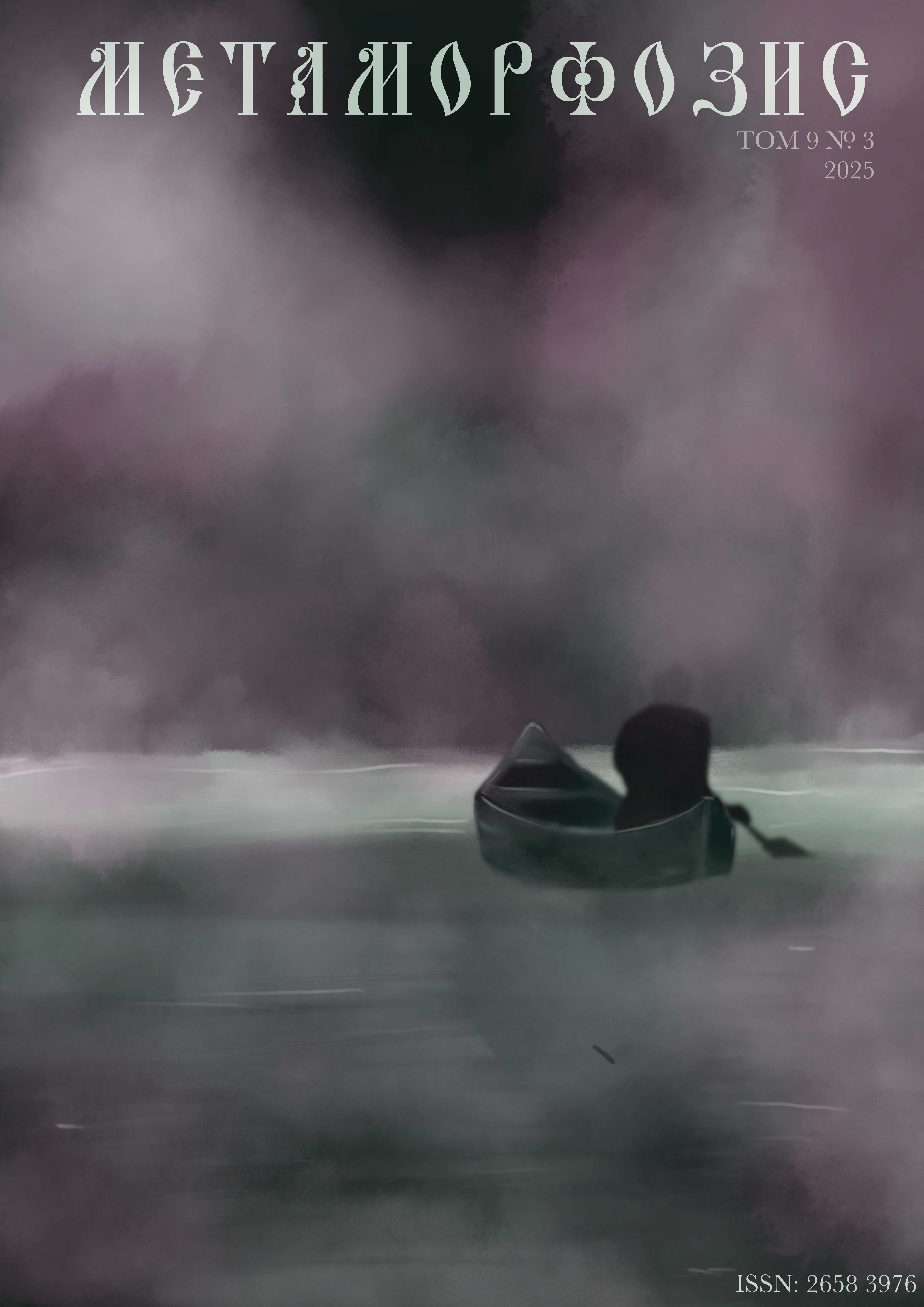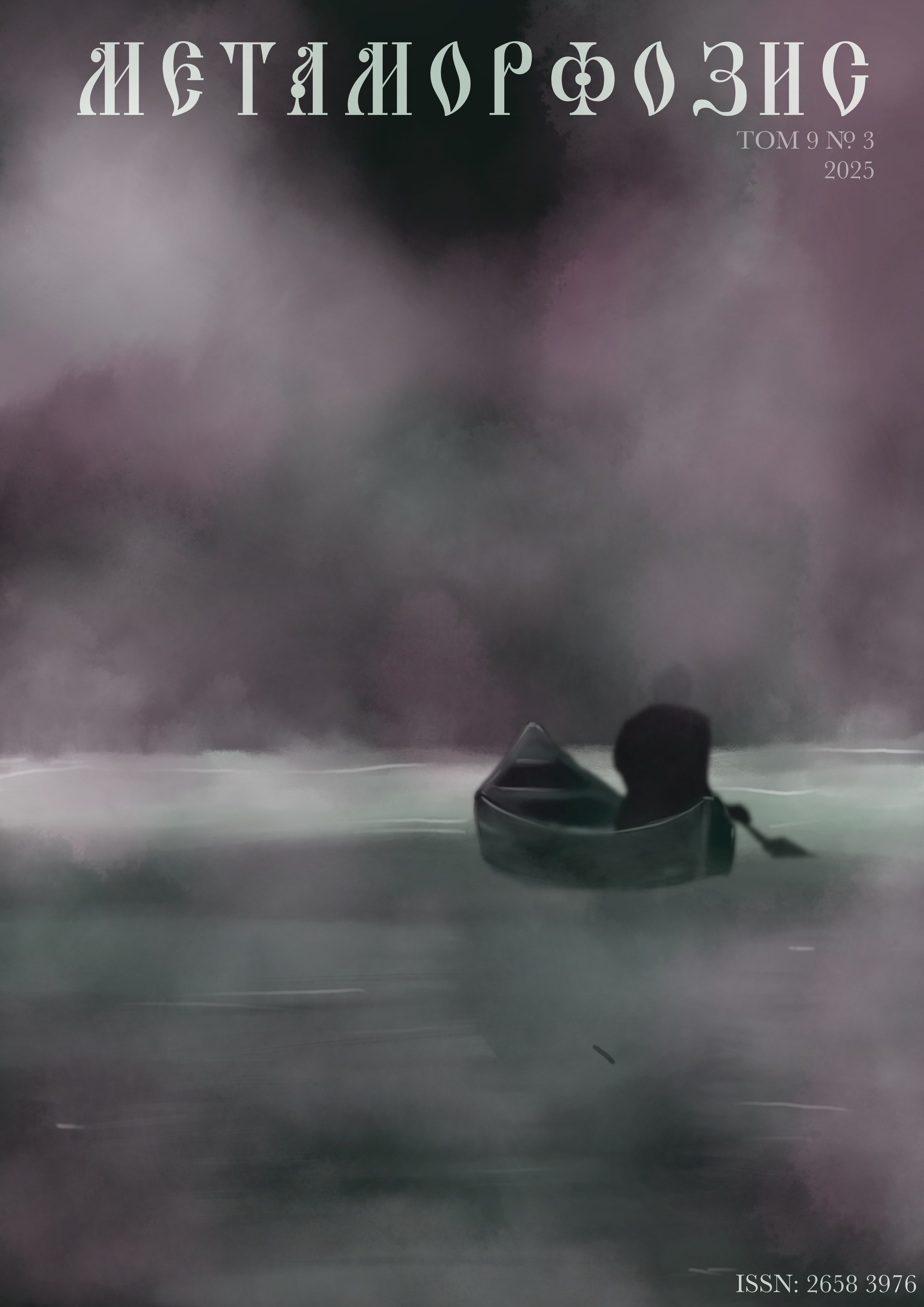-
72
-
10
-
9
-
8
-
6

Dear readers! We are pleased to present to you the third issue of the ninth volume of the journal Metamorphosis. Within its pages, you, alongside our authors, will embark on a journey "in search of meaning and image"—precisely the title of this new issue.
Thematically, it is divided into three sections. The first of these—"Meaning, Idea, Image"—contains articles by participants of the XV International Conference of the School of Philosophy and Cultural Studies at the Faculty of Humanities, National Research University Higher School of Economics ("Culture in the Age of Digitalization"). Through the lens of our authors, we explore the intertwining of philosophy and literature, technical knowledge—sometimes taking unexpected forms of expression.
The issue opens with Daniil Morozov’s article, "Philosophy-as-Art in the Understanding of Ya.E. Golosovker." The author delves into the legacy of one of the most fascinating representatives of 20th-century Russian thought—Ya.E. Golosovker—whose philosophy was not confined to the pages of scholarly tomes but also manifested in life itself. His concept of the connection between philosophy and various art forms remains highly relevant, illustrating the interaction of seemingly disparate fields and thereby establishing an interdisciplinary framework—especially crucial amid the rapid growth of digitalization. The editorial board of Metamorphosis congratulates Daniil on the successful defense of his Ph.D. dissertation in March 2025 on the topic "The Project of Imaginative Philosophy by E.Ya. Golosovker"!
The "baton" of analyzing Russian philosophical heritage is taken up by Ilya Pavlov, whom we congratulate on his promotion to associate professor. His work focuses on the existential reflection of technology in the concepts of N.A. Berdyaev and V.V. Bibikhin. Debates about the role of technology in human and societal life, which preoccupied Russian thinkers of the last century, bear striking resemblance to today’s discussions on AI. In both cases, the issue is broader, if not global, and nearly always centers on humanity. In his research, the author emphasizes the analysis of the role of scientific-technical civilization and modernity as a whole in the philosophy of Berdyaev and Bibikhin.
Alexander Loginov also engages with the study of Russian philosophy, particularly the legacy of V.V. Bibikhin. In his article "Russian Literature in the Philosophical Lens of V.V. Bibikhin," he highlights how Bibikhin’s ideas unfold through an analysis of works by F.M. Dostoevsky, L.N. Tolstoy, and V.V. Rozanov. As a result, philosophical reflections on national literature lead to an attempt to comprehend national self-awareness, culture, and Russia’s place in the world.
Philosophy does not halt its movement: from literary prose, it transitions to poetic forms. At times, philosophical problems cannot be solved by bare rationality or dry scholarship—grasping the mystery requires a special, creative approach. Anton Kulikov’s article "The Philosopher and the Poet Are One and the Same" itself resembles a poetic ode, celebrating the love of wisdom. The author examines how philosophy poetically addresses global problems: it transcends banal logical formalism and arid theories, filling with life and expressing itself in a unique mode—poetic language. It is precisely in this form—though not objective, as the author notes—that truth reveals itself to the philosopher, and dialogue with the world occurs.
Unconventional ideas emerge in the philosophical analysis of C. Wilson’s novel "The Mind Parasites," undertaken by Sergey Lukovenkov. If you’ve ever wondered whether existential problems are relevant to extraterrestrials or how phenomenology helps overcome evolutionary limitations, Sergey’s article is certainly worth a careful read. The author clearly and engagingly demonstrates how and why the problems of phenomenology and existential philosophy are concealed behind Wilson’s fantastical metaphors.
This article inspired the cover design of the journal’s third issue. Our artist, Elena Ashurova, drew attention to the Lovecraftian metaphor referenced by Sergey Lukovenkov: a man in a boat drifting through fog, unable to discern the meaning of existence. Elena traces in the issue’s articles philosophy’s attempts to comprehend reality and engage in a dialogue about the connection between philosophy and art. In this issue, we continue our collaboration with Anastasia Sukhareva, who prepared illustrations for the articles, accompanying them with commentary.
The first thematic block of the new issue concludes with Andrey Bunin’s review article on the conference "Culture in the Age of Digitalization" and the section dedicated to the interpenetration of philosophy and literature within a technical framework, explored in presentations by faculty and graduate students of the School of Philosophy and Cultural Studies at HSE and the Faculty of Philosophy at RSUH.
The second block of our issue is devoted to philosophy in literature. Alongside research presented at the conference, we feature works by our young authors. Ekaterina Demidova offers a fresh perspective on the poetry of E.A. Baratynsky, in which she seeks motifs from the philosophy of B. Pascal. The French philosopher was highly popular in Russia’s intellectual circles of the early 19th century. The author analyzes how Baratynsky’s poetry converges with Pascal’s ideas in themes such as the clash between pessimistic worldviews and profound Christian hope, agonizing skepticism and unwavering striving for faith, acute awareness of life’s imperfection and admiration for divine creation. A recurring thread in Baratynsky’s lyric poetry is the tormenting conflict between emotion and reason—a central subject of Pascal’s reflections and undoubtedly vital for all engaged in philosophy.
Denis Lukshin invites us to delve into socio-political philosophy through his article "Rational Egoism as a Phenomenon of Socio-Political Reality: N.G. Chernyshevsky and A. Rand on the Connection Between Egoism and Progress." The contradictory positions of Chernyshevsky, a theorist of socialism, and Rand, a theorist of capitalism, converge in their treatment of rational egoism—through which, the author argues, we can better understand specific social processes leading to public good amid the pursuit of private gain. Denis’s article intriguingly traces how Hegel’s famous "cunning of reason" finds reflection and development in the works of two Russian-born thinkers who became leading figures in two entirely different intellectual eras.
Many authors in this issue speak of the closeness, even synonymity, of art and philosophy. The final piece focuses on a man for whom art became not only philosophy but a worldview. In a previous issue, we covered the work of Moscow urban artist E.I. Kuman’kov. The new essay is devoted to the life story of his son, Anton Evgenievich, who, like his father, dedicated his life to painting. His brother, Nikita Pokrovsky, recounts Anton Evgenievich’s difficult fate and challenging creative path.
The editorial team would like to thank our colleague Anton Kondratenko for his participation and assistance in preparing materials about dynasties of Russian artists!
Editorial Team








